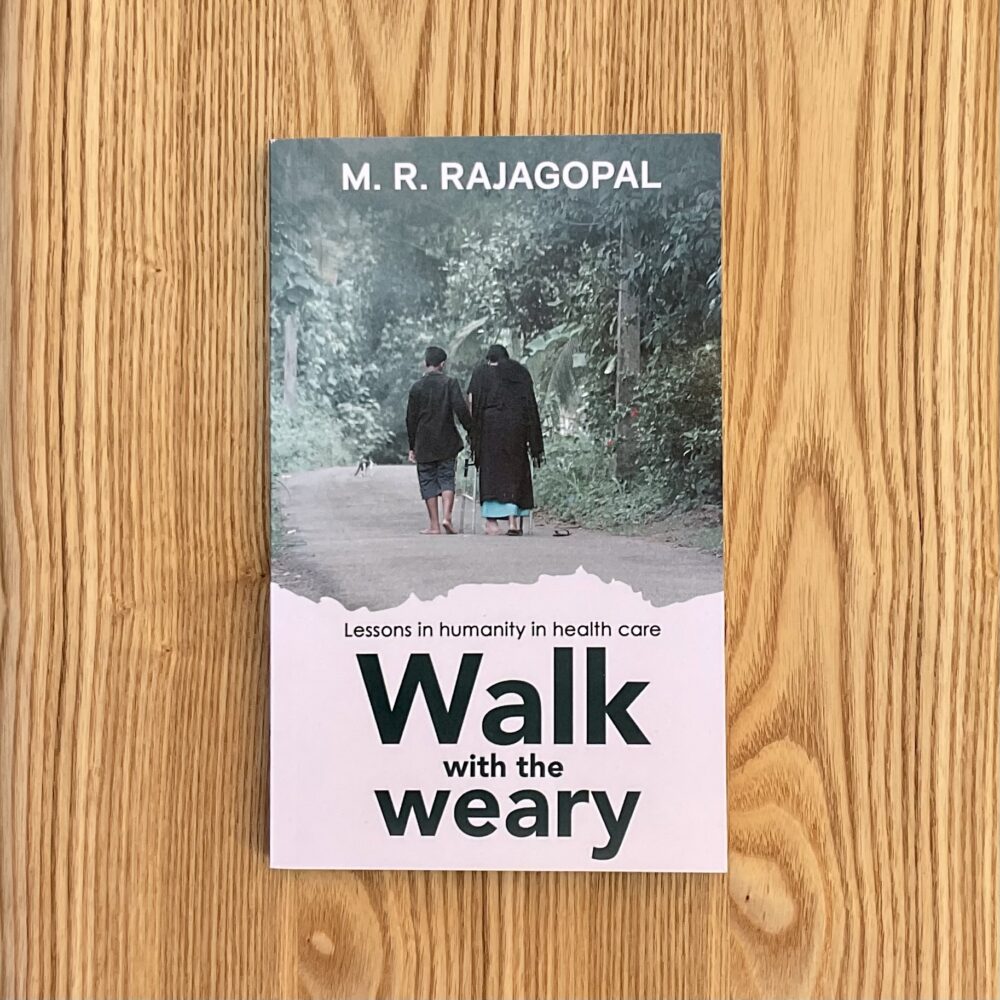I’ve been reading ‘Walk with the Weary’ by MR Rajagopal

This 2022 book by the noted palliative care physician from Kerala in India was highly praised by my Goodreads friend Richard Smith, and sounded like a book which would be up my street. I found it somewhat hard to get hold of a copy, but eventually tracked on down online.
I very much hope that this book becomes more widely available because Rajagopal gives some clear and important messages. His writing considers the limits of medicine, its potential to do net harm by focusing more on diseases than patients, and the fundamental importance of holistic care. While entirely different in tone, the messages reminded me a little of Ivan Illich’s Limits to Medicine.
Rajagopal was a pioneer of palliative care in India, and that aspect of this book was also fascinating. He tells us his story, from first recognising a substantial lacuna in the care of patients (a lack of proper pain management) to building a coalition of likeminded colleagues to ultimately transforming medical practice. This aspect of the book reminded me of Misbehaving by Richard Thaler, his account of how he transformed the field of economics by integrating human behaviour. In some ways, Walk with the Weary is an account of how Rajagopal transformed the field of medicine, especially in India, by integrating human compassion.
Rajagopal’s view is that palliative care ought not to be restricted to those who are dying, but that it should be there for ‘all illness-related suffering.’ I had never conceived of palliative care in that way before, but found the argument inspiring. It encapsulates something important about how medicine is best practised.
One of my regrets about the way public health is practised in the UK is the siloed nature of the work. I work in health protection and mostly deal with the acute response to cases of significant infectious diseases. Often, the people who are suffering with these diseases have myriad other needs, but there is no overall coordinating ‘sorter of problems’ to tackle that. I found Rajagopal’s account of overcoming broadly similar structural barriers in his work inspiring.
Some notable quotations I took away from this book:
Imagine a researcher, a few centuries from now, going through the history of ‘Modern Medicine.’ What would her verdict be on healthcare in the early twenty-first century? What would she feel about the healthcare system in which, despite all the accumulated medical knowledge, 80% of the world continues not to have access to basic pain relief? Would she not ask herself—how could they be so senseless to invest so much time, energy, and money in research on ‘conquering’ diseases but not focus on channelling that knowledge so as to provide relief to those in suffering?
No therapeutic scan has yet been created that can measure happiness. There is no medical intervention yet that can generate joy, but the love that I give and the love I receive may be able to do that. If I am made physically comfortable within reasonable limits, this love could well be the only thing that matters as death approaches.
The world over, pain seems to be poorly understood and taught. Diseases are given importance; pain or suffering is ignored.
Many people, including many medical and nursing professionals in India, fail to realise the depth and nature of pain. It can be beyond the average person’s imagination. If severe, it affects your personality and changes you from a sociable human being to a selfish being, caring about nothing other than one’s own pain. It fills the mind space, leaving no space for rational decision-making.
This change in behaviour is immediate when a sudden, agonising pain occurs, but generally resolves completely when the pain is relieved. Sadly, and more tragically, long-term pain, such as low back pain, often irrevocably changes a person. The person may manage to put on a normal front to the world at large, but once back in the privacy of his or her own home, the façade crumbles. The irritability surprises, others; and at some point, it wrecks relationships – between spouses, between parents and children, and eventually with colleagues too. 
There was a lot of food for thought in this book.
This post was filed under: Health, Post-a-day 2023, What I've Been Reading, MR Rajagopal.